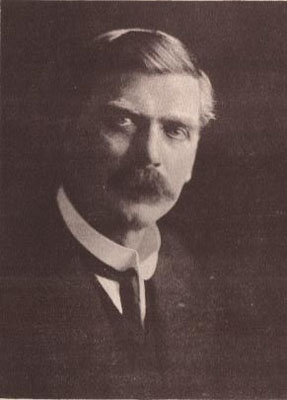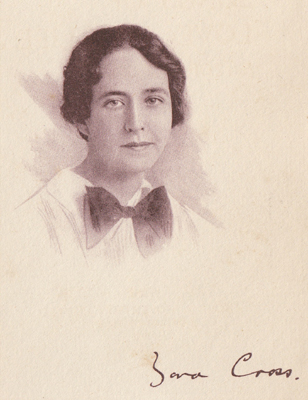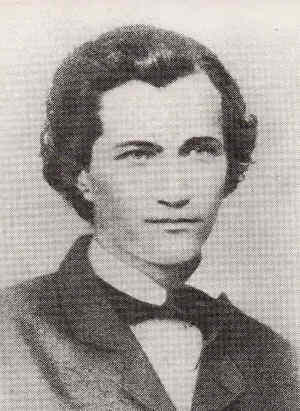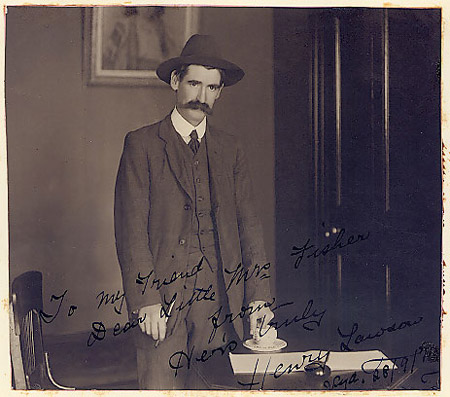Stand up, my young Australian,
In the brave light of the sun,
And hear how Freedom's battle
Was in the old days lost -- and won.
The blood burns in my veins, boy,
As it did in years of yore,
Remembering Eureka,
And the men of 'Fifty-four.
The old times were the grand times,
And to me the Past appears
As rich as seas at sunset,
With its many-coloured years;
And like a lonely island
Aglow in sunset light,
One day stands out in splendour --
The day of the Good Fight.
Where Ballarat the Golden
On her throne sits like a Queen,
Ten thousand tents were shining
In the brave days that have been.
There dwelt the stalwart diggers,
When our hearts with hope were high.
The stream of Life ran brimming
In that golden time gone by.
They came from many countries,
And far islands in the main,
And years shall pass and vanish
Ere their like are seen again.
Small chance was there for weaklings
With these man of iron core,
Who worked and played like Giants
In the year of 'Fifty-four.
The Tyrants of the Goldfields
Would not let us live in peace;
They harried us and chased us
With their horse and foot police.
Each man must show his licence
When they chose, by fits and starts:
They tried to break our spirits,
And they almost broke our hearts.
We wrote a Declaration
In the store of Shanahan,
Demanding Right and justice,
And we signed it, man by man,
And unto Charles Hotham,
Who was then the Lord of High,
We sent it; Charles Hotham
Sent a regiment in reply.
There comes a time to all men
When submission is a sin;
We made a bonfire brave, and
Flung our licences therein.
Our hearts with scorn and anger
Burned more fiercely than the flame,
Full well we knew our peril,
But we dared it all the same.
On Bakery Hill the Banner
Of the Southern Cross flew free;
Then up rose Peter Lalor,
And with lifted hand spake he: --
"We swear by God above us
While we live to work and fight
For Freedom and for justice,
For our Manhood and our Right.'
Then, on the bare earth kneeling,
As on a chapel-floor,
Beneath the sacred Banner,
One and all, that oath we swore;
And some of those who swore it
Were like straws upon a flood,
But there were men who swore it
And who sealed it with their blood.
We held a stern War Council,
For in bitter mood were we,
With Vern and Hayes and Humffray,
Brady, Ross, and Kennedy,
And fire-eyed Raffaello,
Who was brave as steel, though small
But gallant Peter Lalor
Was the leader of us all.
Pat Curtain we made captain
Of our Pikemen, soon enrolled,
And Ross, the tall Canadian,
Was our standard-bearer bold.
He came from where St Lawrence
Flows majestic to the main;
But the River of St Lawrence
He would never see again.
Then passed along the order
That a fortress should be made,
And soon, with planks and palings,
We constructed the Stockade.
We worked in teeth-set silence,
For we knew what was in store:
Sure never men defended
Such a feeble fort before.
All day the German blacksmith
At his forge wrought fierce and fast;
All day the gleaming pike-blades
At his side in piles were cast;
All day the diggers fitted
Blade to staff with stern goodwill,
Till all men, save the watchers,
Slept upon the fatal hill.
The night fell cold and dreary,
And the hours crawled slowly be.
Deep sleep was all around me,
But a sentinel was I.
And then the moon grew ghostly,
And I saw the grey dawn creep,
A wan and pallid phantom
O'er the Mount of Warrenheip.
When over the dark mountain
Rose the red rim of the sun,
Right sharply in the stillness
Rang our picket's warning gun.
And scarce had died the echo
Ere, of all our little host,
Each man had grasped his weapon,
And each man was at his post.
The foe came on in silence
Like an army of the dumb;
There was no blare of trumpet.
And there was no tap of drum.
But ever they came onward,
And I thought, with indrawn breath,
The Redcoats looked like Murder,
And the Blackcoats looked like Death.
Our gunners, in their gun-pits
That were near the palisade,
Fired fiercely, but the Redcoats
Fired as if upon parade.
Yet, in the front rank leading
On his men with blazing eyes,
The bullet of a digger
Struck down valiant Captain Wise.
Then "Charge!" cried Captain Thomas,
And with bayonets fixed they came.
The palisade crashed inwards,
Like a wall devoured by flame.
I saw our gallant gunners,
Struggling vainly, backward reel
Before that surge of scarlet
All alive with stabbing steel.
There Edward Quinn of Cavan,
Samuel Green the Englishman,
And Haffele the German,
Perished, fighting in the van.
And with the William Quinlan
Fell while battling for the Right,
The first Australian Native
In the first Australian Fight.
But Robertson the Scotchman,
In his gripping Scottish way,
Caught by the throat a Redcoat,
And upon that Redcoat lay.
They beat the Scotchman's head in
Smiting hard with butt of gun,
And slew him -- but the Redcoat
Died before the week was done.
These diggers fought like heroes
Charged to guard a kingdom's gate.
But vain was all their valour,
For they could not conquer Fate.
The Searchers for the Wounded
Found them lying side by side.
They lived good mates together,
And good mates together died.
Then Peter Lalor, gazing
On the fight with fiery glance,
His lion-voice uplifted,
Shouting, 'Pikemen, now advance!'
A bullet struck him, speaking,
And he fell as fall the dead:
The Fight had lost its leader,
And the Pikemen broke and fled.
The battle was not over,
For there stood upon the hill
A little band of diggers,
Fighting desperately still,
With pistol, pike, and hayfork,
Against bayonet and gun.
There was no madder combat
Ever seen beneath the sun.
Then Donaghey and Dimond,
And Pat Gittins fighting fell,
With Thaddeus Moore, and Reynolds:
And the muskets rang their knell.
And staring up at Heaven,
As if watching his soul's track,
Shot through his heart so merry,
Lay our jester 'Happy Jack'.
The sky grew black above us,
And the earth below was red,
And, oh, our eyes were burning
As we gazed upon our dead.
On came the troopers charging,
Valiant cut-throats of the Crown,
And wounded men and dying
Flung their useless weapons down.
The bitter fight was ended,
And, with cruel coward-lust,
They dragged our sacred Banner
Through the Stockade's bloody dust.
But, patient as the gods are,
Justice counts the years and waits --
That Banner now waves proudly
Over six Australian States.
I said, my young Australian,
That the fight was lost -- and won --
But, oh, our hearts were heavy
At the setting of the sun.
Yet, ere the year was over,
Freedom rolled in like a flood:
They gave us all we asked for --
When we asked for it in blood.
God rest you, Peter Lalor!
For you were a whiteman whole;
A swordblade in the sunlight
Was your bright and gallant soul.
And God reward you kindly,
Father Smith, alive or dead:
'Twas you that give him shelter
When a price was on his head.
Within the Golden City
In the place of peace profound
The Heroes sleep. Tread softly:
'Tis Australia's Holy Ground.
And ever more Australia
Will keep green in her heart's core
The memory of Lalor
And the men of 'Fifty-four.
First published in
The Bulletin, 19 January 1911;
and later in
Old Ballads from the Bush edited by Bill Scott, 1987;
Bugger the Music, Give Us a Poem! edited by Keith McKenry, 1998;
The Turning Wave: Poems and Songs of Irish Australia edited by Colleen Burke and Vincent Woods, 2001;
An Australian Treasury of Popular Verse edited by Jim Haynes, 2002; and
Two Centuries of Australian Poetry edited by Kathrine Bell, 2007.
Note: the subject of this poem concerns the
Eureka Rebellion in Ballarat, Victoria, in 1854.
Author: Victor Daley (1858-1905) was born in Armagh, Ireland, and arrived in Australia in 1878 where he worked as a journalist and poet. He was very prolific, using the pen-name of Creeve Roe as well as his own name to produce a large number of poems, mainly for
The Bulletin. He died of tuberculosis in 1905.
Author reference sites: Austlit,
Australian Dictionary of Biography,
Australian Poetry LibrarySee
also.




